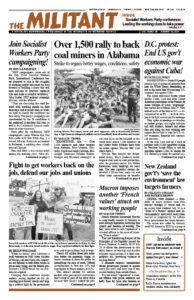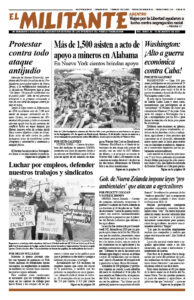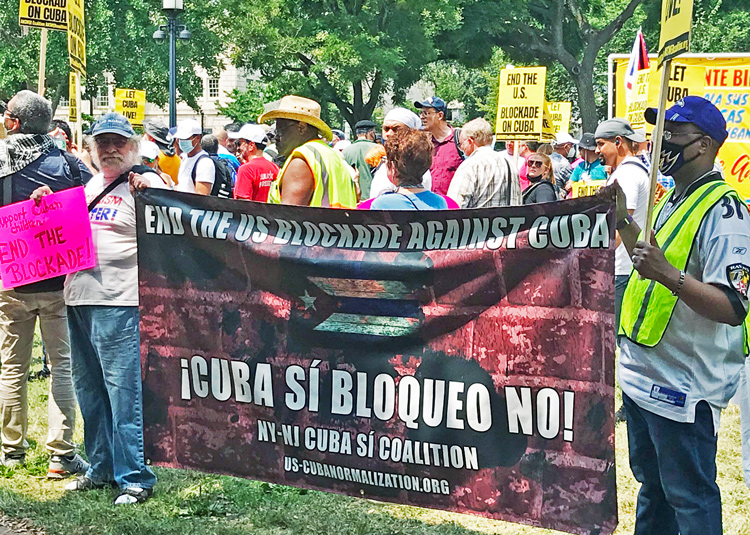WASHINGTON — Some 300 people joined a July 25 protest at Lafayette Park near the White House, demanding an end to the more than 60-year-long U.S. economic war against Cuba.
The action welcomed Seattle school teacher Carlos Lazo and other Cuban American participants in the Puentes de Amor (Bridges of Love) “pilgrimage” that started out in Miami June 27. They walked much of the way to D.C. — accompanied by an RV — to draw attention to the fight to overturn the embargo.
They spoke at meetings in churches, to student groups, civil rights activists, and with workers, farmers and others they met along the way, winning new support for the fight to stop the U.S. rulers’ economic, financial and commercial sanctions.
At the rally Lazo held up a stack of petitions with 27,000 signatures calling on President Joseph Biden to end the sanctions against Cuba, to reopen the U.S. Embassy to allow the normal issuing of visas, and to end restrictions on travel to the island.
“It’s extraordinary the many people we met who are opposed to the sanctions,” Lazo said. “At the same time, we ended up learning ourselves that it’s not only a blockade against Cuba. Here in the U.S. there is a blockade against minorities, the lack of opportunities, the discrimination.” He pointed to their visit with Black farmer Willie Head in Pavo, Georgia, who told Lazo how the U.S. government denies credit to Black farmers, which has driven many farmers off the land.
During the 2020 election campaign “Biden promised he would lift the sanctions, but he hasn’t,” Lazo said. “We are saying, ‘Yes to Cuba! No blockade!’”
Among the groups co-sponsoring the rally were the National Network on Cuba, Puentes de Amor, CODEPINK, DC Metro Coalition in Solidarity with the Cuban Revolution, Socialist Workers Party and ANSWER Coalition.
A busload came from New York City, including a contingent from the Frente Independentista Boricua, a coalition that backs the fight for independence for the U.S. colony of Puerto Rico.
The U.S. economic war on Cuba, begun in 1960 and maintained by every U.S. president since, Democrat and Republican alike, is taking an increasing toll on Cuba, alongside the worldwide capitalist economic crisis and the COVID-19 pandemic and the blows these deal to tourist revenue for Cuba.
There are severe shortages of basic medicines; scarcity of food, especially of the foods that Cubans like to eat; and a recent spate of electrical blackouts.
“These are difficult times for the Cuban people,” Sandra Soca, one of the Puentes de Amor walkers, told the Militant at the rally. Along with ending financial sanctions, the group is calling for lifting restrictions on travel to Cuba. “They don’t want the American people to see with their own eyes the reality of Cuba and the reality of the impact of the sanctions.”
Omari Musa, a representative of the DC Metro Coalition in Solidarity with the Cuban Revolution, told the rally that the U.S. government has never forgiven the people of Cuba for replacing the Batista dictatorship with a workers and farmers government and making a socialist revolution.
The U.S. economic war and threats of a military intervention “will only serve to unite the Cuban people against the country that is trying to suffocate them,” José Pertierra, a lawyer who supports the Cuban Revolution, told the rally.
Other protests against the embargo, including car caravans, took place the same weekend in Montreal, Paris, Chicago, Dallas and other cities.
Right-wing counterprotest
A counterprotest — called by rightist Miami social-media commentator Alexander Otaola to respond to growing support among Cuban Americans for Lazo’s walk — drew 700 people to the same park. The rightists stayed there overnight, outside the White House, growing to a few thousand the next day.
The anti-Cuba action claimed to speak for protests that had taken place in Cuba July 11 protesting the economic crisis and shortages. Those actions were organized by groups funded by the U.S. government. In several instances, so-called protesters looted stores and overturned vehicles.
“We don’t want food for Cuba. We don’t want remittances. We want freedom,” Otaola demagogically told the crowd outside the White House July 26. “We want intervention” by Washington, he said.
Cuban Americans: ‘No!’ to embargo
A large number of the participants in the rally against the U.S. embargo were of Cuban descent.
“The U.S. government doesn’t let me help my mother, my grandmother. I don’t understand it,” Michel Pérez, a Cuban-born factory worker at his first protest against the embargo, told the Militant, referring to U.S. measures that block sending money to relatives in Cuba.
Pérez moved to the U.S. from Cuba five years ago, “not because I oppose the revolution. I support it,” he said. Pointing at the counterprotest, Pérez said that they don’t represent the millions of Cubans living in the U.S., who in their majority oppose the sanctions.
Opponents of the Cuban Revolution “say that the embargo hurts the government of Cuba,” said María Rodríguez, a worker at Costco, from Lorton, Virginia. “But it’s the Cuban people who are being hurt.”
Hebel Morales said that the right-wing protesters in the park “should be ashamed of themselves, calling for more hardships for their own families in Cuba.” Morales said he thinks some “changes” are needed, but he opposed those protesting against the government in Cuba. “Breaking into stores and stealing, is not the way to go.”
“Lift the embargo and see what happens,” Morales said. “Let the people of Cuba make their own decisions.”
In the evening, 150 people attended a panel at Busboys and Poets restaurant featuring Lazo and other participants in the Puentes de Amor walk. The event was sponsored by CODEPINK.
“We believe in the diversity of the Cuban people who can decide for themselves the future of their country,” walker Soca said. “Our souls cannot be broken. We will keep fighting!”
Rachele Fruit contributed to this article.


